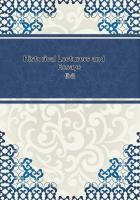But the question how he could rightfully employ his power to bring on its speedy destruction was to him not a question of mere sentiment. He himself set forth his reasoning upon it, at a later period, in one of his inimitable letters. "I am naturally antislavery," said he. "If slavery is not wrong, nothing is wrong. I cannot remember the time when I did not so think and feel. And yet I have never understood that the Presidency conferred upon me an unrestricted right to act upon that judgment and feeling. It was in the oath I took that I would, to the best of my ability, preserve, protect, and defend the Constitution of the United States. I could not take the office without taking the oath. Nor was it my view that I might take an oath to get power, and break the oath in using that power. I understood, too, that, in ordinary civil administration, this oath even forbade me practically to indulge my private abstract judgment on the moral question of slavery. I did understand, however, also, that my oath imposed upon me the duty of preserving, to the best of my ability, by every indispensable means, that government, that nation, of which the Constitution was the organic law. I could not feel that, to the best of my ability, I had even tied to preserve the Constitution--if, to save slavery, or any minor matter, I should permit the wreck of government, country, and Constitution all together." In other words, if the salvation of the government, the Constitution, and the Union demanded the destruction of slavery, he felt it to be not only his right, but his sworn duty to destroy it. Its destruction became a necessity of the war for the Union.
As the war dragged on and disaster followed disaster, the sense of that necessity steadily grew upon him. Early in 1862, as some of his friends well remember, he saw, what Seward seemed not to see, that to give the war for the Union an antislavery character was the surest means to prevent the recognition of the Southern Confederacy as an independent nation by European powers; that, slavery being abhorred by the moral sense of civilized mankind, no European government would dare to offer so gross an insult to the public opinion of its people as openly to favor the creation of a state founded upon slavery to the prejudice of an existing nation fighting against slavery. He saw also that slavery untouched was to the rebellion an element of power, and that in order to overcome that power it was necessary to turn it into an element of weakness. Still, he felt no assurance that the plain people were prepared for so radical a measure as the emancipation of the slaves by act of the government, and he anxiously considered that, if they were not, this great step might, by exciting dissension at the North, injure the cause of the Union in one quarter more than it would help it in another. He heartily welcomed an effort made in New York to mould and stimulate public sentiment on the slavery question by public meetings boldly pronouncing for emancipation. At the same time he himself cautiously advanced with a recommendation, expressed in a special message to Congress, that the United States should co-operate with any State which might adopt the gradual abolishment of slavery, giving such State pecuniary aid to compensate the former owners of emancipated slaves. The discussion was started, and spread rapidly. Congress adopted the resolution recommended, and soon went a step farther in passing a bill to abolish slavery in the District of Columbia. The plain people began to look at emancipation on a larger scale as a thing to be considered seriously by patriotic citizens; and soon Lincoln thought that the time was ripe, and that the edict of ******* could be ventured upon without danger of serious confusion in the Union ranks.
The failure of McClellan's movement upon Richmond increased immensely the prestige of the enemy. The need of some great act to stimulate the vitality of the Union cause seemed to grow daily more pressing. On July 21, 1862, Lincoln surprised his cabinet with the draught of a proclamation declaring free the slaves in all the States that should be still in rebellion against the United States on the 1st of January,1863. As to the matter itself he announced that he had fully made up his mind; he invited advice only concerning the form and the time of publication. Seward suggested that the proclamation, if then brought out, amidst disaster and distress, would sound like the last shriek of a perishing cause. Lincoln accepted the suggestion, and the proclamation was postponed. Another defeat followed, the second at Bull Run. But when, after that battle, the Confederate army, under Lee, crossed the Potomac and invaded Maryland, Lincoln vowed in his heart that, if the Union army were now blessed with success, the decree of ******* should surely be issued. The victory of Antietam was won on September 17, and the preliminary Emancipation Proclamation came forth on the a 22d.
It was Lincoln's own resolution and act; but practically it bound the nation, and permitted no step backward. In spite of its limitations, it was the actual abolition of slavery. Thus he wrote his name upon the books of history with the title dearest to his heart, the liberator of the slave.
It is true, the great proclamation, which stamped the war as one for "union and *******," did not at once mark the turning of the tide on the field of military operations. There were more disasters, Fredericksburg and Chancellorsville. But with Gettysburg and Vicksburg the whole aspect of the war changed.















